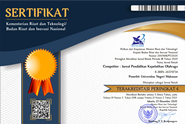Coach’s Leadership Styles of Soccer School (SSB): Based on Athlete's Perspective
(1) Universitas Pendidikan Indonesia
(2) Universitas Pendidikan Indonesia
(3) Universitas Pendidikan Indonesia
(4) Universitas Pendidikan Indonesia
(*) Corresponding Author
DOI: https://doi.org/10.26858/cjpko.v16i2.62408
Abstract
The coach's leadership style in fostering athletes is one of the main keys to athlete success. A distinctive leadership style helps the coach deliver training material effectively. This study aims to determine the coach's leadership style used in soccer schools (SSB) in terms of perspective. The research method used quantitative descriptive method involving 23 athletes of SSB Baleendah Selection aged 13 years. The instrument used is the coach's leadership style questionnaire. Percentage results are presented as data analysis. The results showed that the dominant coach leadership style used at SSB Baleendah Selection was the democratic coach leadership style of 58% and the authoritarian coach leadership style of 42%. This study concludes that the democratic coach's leadership style is the more dominant leadership style applied to soccer schools, specifically at the age of 13 years.
Keywords
References
Acet, M., Gumusgul, A., & Isik, U. (2017). Leadership Characteristics of Football Coaches. Sp Soc Int J Phy Ed Sp, 15(2), 3–10.
Beckner, B. N., & Record, R. A. (2016). Navigating the thin-ideal in an athletic world: influence of coach communication on female athletes’ body image and health choices. Health Communication, 31(3), 364–373. https://doi.org/10.1080/10410236.2014.957998
Croad, A., & Vinson, D. (2018). Investigating games-centred pedagogies to enhance athlete decision making in elite coaching contexts. International Journal of Coaching Science, 12(1), 35–68.
Ekstrand, J., Lundqvist, D., Lagerbäck, L., Vouillamoz, M., Papadimitiou, N., & Karlsson, J. (2017). Is there a correlation between coaches’ leadership styles and injuries in elite football teams? A study of 36 elite teams in 17 countries. British Journal of Sports Medicine, 52(8), 527–531. https://doi.org/10.1136/bjsports-2017-098001
Harsono. (2017). Kepelatihan Olahraga: Teori dan Metodologi. PT. Remaja Rosdakarya.
Iancheva, T., & Prodanov, G. (2019). Coaching Efficacy and Leadership Style Among Bulgarian Football Coaches. Proceeding Book 1, 242–248. https://doi.org/10.37393/icass2019/46
Jin, H., Kim, S., Love, A., Jin, Y., & Zhao, J. (2022). Effects of leadership style on coach-athlete relationship, athletes’ motivations, and athlete satisfaction. Frontiers in Psychology, 13, 1012953.
Keatlholetswe, L., & Malete, L. (2019). Coaching Efficacy, Player Perceptions of Coaches’ Leadership Styles, and Team Performance in Premier League Soccer. Research Quarterly for Exercise and Sport, 90(1), 71–79. https://doi.org/10.1080/02701367.2018.1563277
Kim, H. D., & Cruz, A. B. (2016). The influence of coaches’ leadership styles on athletes’ satisfaction and team cohesion: A meta-analytic approach. International Journal of Sports Science and Coaching, 11(6), 900–909. https://doi.org/10.1177/1747954116676117
Komarudin. (2016). Psikologi Olahraga. PT. Remaja Rosdakarya.
Lee, Y. H., Hwang, S., & Choi, Y. (2017). Relationship between coaching leadership style and young athletes’ social responsibility. Social Behavior and Personality, 45(8), 1385–1396. https://doi.org/10.2224/sbp.6176
Martens, R., & Vealey, R. S. (2024). Successful Coaching (5th ed.). Human Kinetics.
Novian, G., & Noors, I. P. M. (2020). Hubungan Gaya Kepemimpinan Pelatih Dengan Prestasi Atlet Taekwondo. 11(02), 151–164.
Nurhayati, S. (2019). Hubungan Gaya Kepemimpinan Pelatih dengan Motivasi Berprestasi Atlet Kempo Jawa Barat. Universitas Pendidikan Indonesia.
Saputra, M. Y., Subarjah, H., Komarudin, K., Hidayat, Y., & Nurcahya, Y. (2022). Psychological Skill Training Implementation to Improve Football Referee Decision-Making Skills. Jurnal Pendidikan Jasmani Dan Olahraga, 7(1), 81–89. https://doi.org/10.17509/jpjo.v7i1.44849
Sullah, A., Hian, T. C., & Ismail, S. (2014). Prefer red Coaches’ Leadership Styles of Malaysian Football Teams. https://doi.org/10.1007/978-981-287-107-7
Szedlak, C., Smith, M. J., Day, M. C., & Greenlees, I. A. (2015). Effective behaviours of strength and conditioning coaches as perceived by athletes. International Journal of Sports Science and Coaching, 10(5), 967–984. https://doi.org/10.1260/1747-9541.10.5.967
Wachsmuth, S. (2014). Team Cohesion and Players ’ Satisfaction in Elite Sport. 21.
Yusria, I. F., Halilintar, D. P., Ilyas, M. P., & Kholisoh, N. Q. (2020). Pengaruh Gaya Kepemimpinan Otoriter pada Usia Remaja. At-Tajdid : Jurnal Pendidikan Dan Pemikiran Islam, 4(01), 67. https://doi.org/10.24127/att.v4i01.1189
Zuberbuhler, M. J. P., Salanova, M., & Martínez, I. M. (2020). Coaching-Based Leadership Intervention Program: A Controlled Trial Study. Frontiers in Psychology, 10(January), 1–22. https://doi.org/10.3389/fpsyg.2019.03066
Article Metrics
Abstract view : 12 times |Refbacks
- There are currently no refbacks.
Copyright (c) 2024 Avecenna Ulupi Assami, Komarudin Komarudin, Mochamad Yamin Saputra, Geraldi Novian

This work is licensed under a Creative Commons Attribution 4.0 International License.
COMPETITOR IS LICENSED BY :
 COMPETITOR is licensed under a Creative Commons Attribution 4.0 International License.
COMPETITOR is licensed under a Creative Commons Attribution 4.0 International License.
COMPETITOR EDITORIAL LOCATION :
![]() Kampus FIK Banta Bantaeng, Jalan Wijaya Kusuma Nomor 14, Rappocini, Makassar, Postal Code 90222
Kampus FIK Banta Bantaeng, Jalan Wijaya Kusuma Nomor 14, Rappocini, Makassar, Postal Code 90222
COMPETITOR IS INDEXED BY















